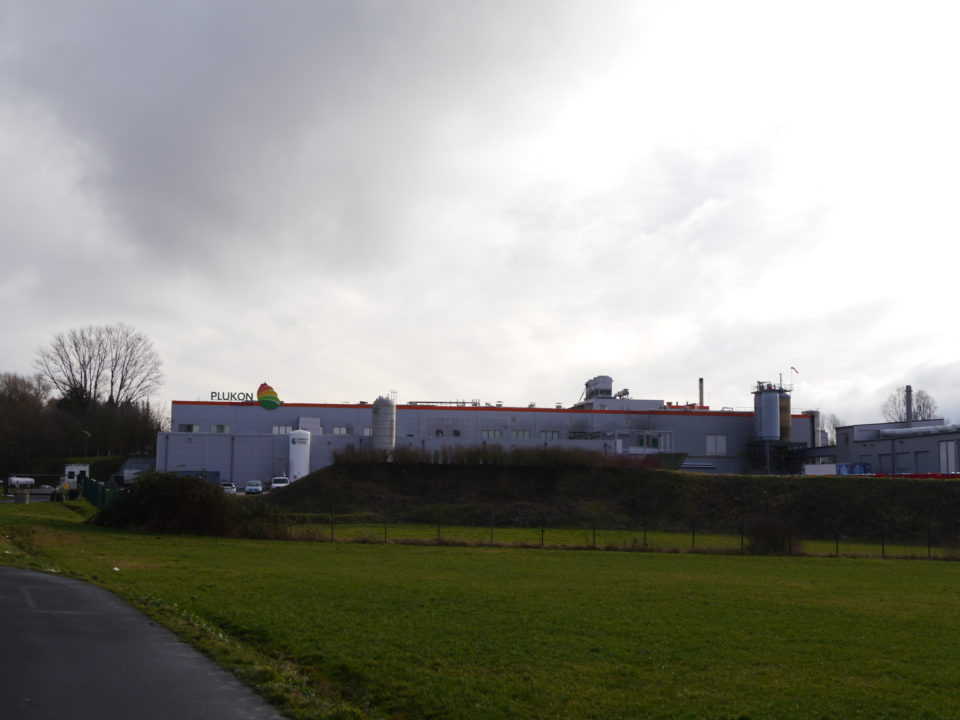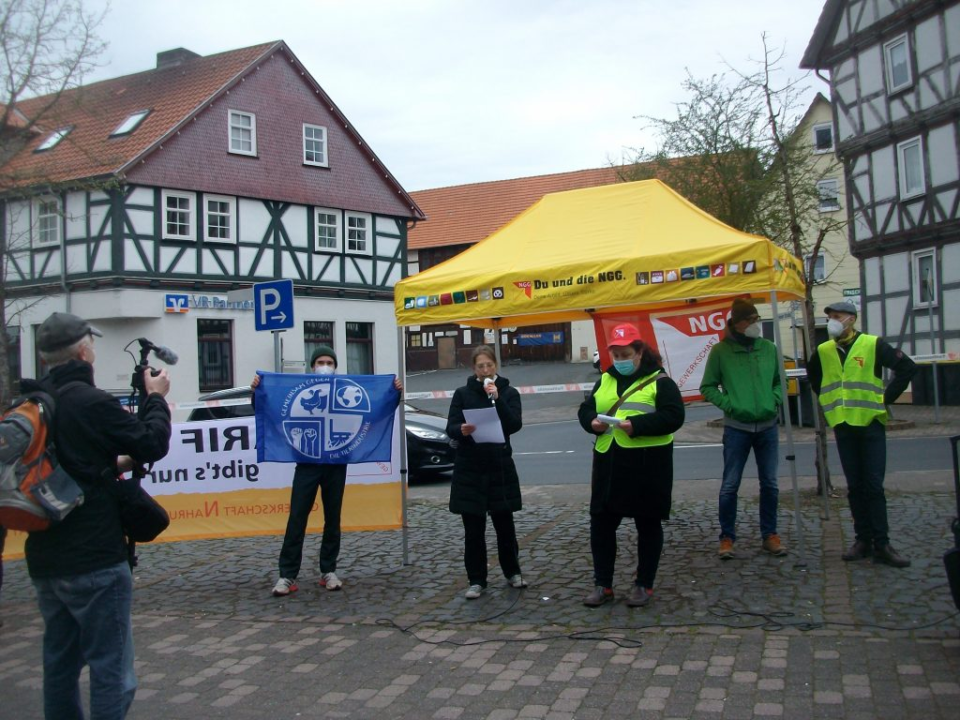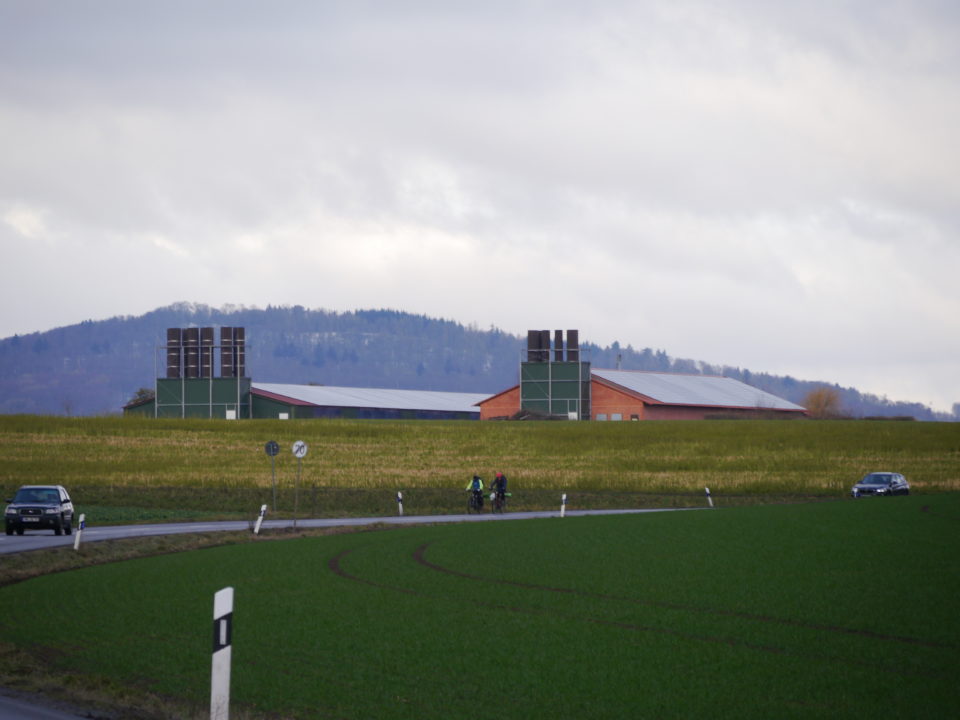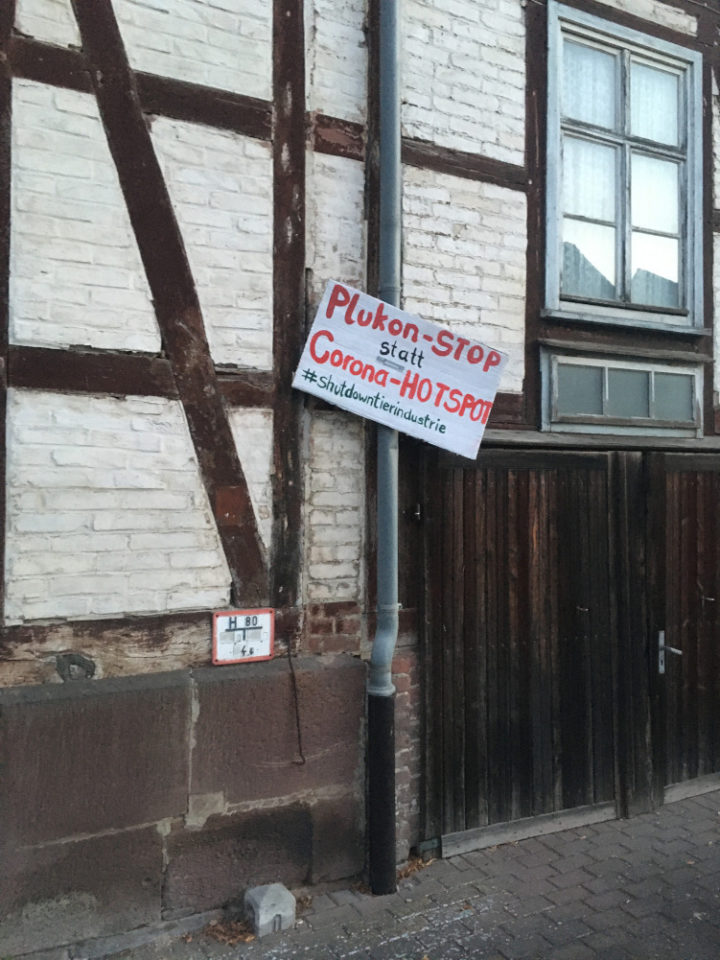The meat company Plukon operates in Gudensberg, knapp 20 km southwest of Kassel, Hesse's largest poultry slaughterhouse. There will be about 130.000 Chickens slaughtered per day. Plukon is over with a total 425 Million chickens killed each year the second largest chicken company in the EU – and thus a key player in the global animal industry. A report on the slaughter factory and the local resistance.

The meat industry regularly makes negative headlines in the press. 2020 it was above all the precarious working conditions of meat workers, 2019 including the role of feed imports in the ongoing fires in the Amazon, and over and over again appalling, terrifying images of animal suffering. In the regional press, however, little is given about the local meat industry. In Gudensberg in the Schwalm-Eder district, knapp 20 Kilometers southwest of Kassel, the company "Plukon Food Group" operates Hessen's largest poultry slaughterhouse.
Die Plukon Food Group
The Plukon Food Group is an international poultry group based in the Netherlands. With a slaughter amount of 426,4 Million chickens a year 2019 Plukon is the second largest chicken processor in the EU, in a global comparison it occupies place 16. The turnover of the meat company was 2019 1,8 billion euro. Compared to the year 2016 sales rose by just under 30%, across from 2010 even around over 140%.
In view of this market position it becomes apparent, that Plukon plays a central role in the European meat industry. Plukon is regularly made explicit about the various harmful effects, for which the industry is known, connected. For example has the “NGO Germanwatch” set out, how Plukon and the other four largest German poultry meat producers share responsibility for human rights violations in the global south: Soy cultivation for animal feed often leads to land evictions and toxic pesticide use in South America, Exports of poultry parts from the EU threatened the economic survival of local producers in West Africa and endangered their livelihoods.
Likewise in a study by Germanwatch it was proven, that every third chicken from Plukon is contaminated with antibiotic-resistant pathogens, which can lead to serious infections in humans. Film materials from mast systems, who supply the slaughterhouses, prove catastrophic husbandry conditions.
Plukon in Northern Hesse
Of the 27 The group has branches in various EU member states, one location is here in the Schwalm-Eder district in northern Hesse: Plukon operates the largest poultry slaughterhouse in Hesse in Gudensberg.
Only recently the slaughterhouse was in public due to current labor disputes: The Food-Enjoyment-Restaurants Union (kurz NGG) conducts collective bargaining with the meat companies and also represents workers at the Gudensberg slaughterhouse. Am 17. April a rally took place on the Gudensberg market square, at the next 100 Workers also participated in a number of union and civil society groups.

Miserable working conditions are not a recent phenomenon in Gudensberg. Andreas Kampmann, Managing Director of the NGG Region North- and Central Hesse, carried out in a speech, that a number of meat companies in Gudensberg had to give up despite poor pay for workers: “The poultry slaughterhouse has had many owners: […] We had quivers, we had Menzefricke, we had studs, and now we have Plukon. And no matter who the owner was: bad, low wages did not protect, that the company was closed. "
Gerhard Köcher from Gudensberg established the local poultry industry: In the 1970s he set up a turkey meat business. 1975 An industrial complex was built in the immediate vicinity of today's slaughterhouse, 1992 Quiver then made a turnover of up to 32 Million DM. After that, however, things went downhill economically. After his bankruptcy 2000 the poultry company Stolle expanded the location, until in the year 2012 the slaughterhouse passed to the current owner: Plukon.
Since then, the group has continuously developed the location. 2014 the slaughterhouse capacity doubled as part of an expansion of the slaughterhouse 250 Tons of live weight per day, followed by an extension to 275 Tons of live weight per day per year 2019. In April 2020 the group asked again for an extension this time 405 Tons, but this was rejected by the regional council.
That the state permit can only be measured in tons, already makes clear: the animals are merely treated like goods. With an assumed slaughter weight of on average 2 Kilograms are daily in Gudensberg 137.500 Chickens already slaughtered by themselves.
A slaughterhouse rarely comes alone
The slaughterhouse is used by up to 400 km distant mast systems supplied. The location directly on the Gudensberger driveway on the A49 motorway is therefore no coincidence. However, there are also a large number of mast systems in the immediate north Hessian area. The citizens' initiative Chattengau against factory farming hat 2017 all stables compiled in one map, which illustrates the extent of the North Hessian animal industry.

In addition to the Chattengau citizens 'initiative, a whole series of citizens' initiatives emerged, who oppose the new construction and the expansion of mast systems. In particular, the slaughterhouse expansion in the year 2014 has led to a wave of protests. 2018 emerged from this context the Action group Agrarwende North Hesse , which on the one hand tries to prevent concrete construction projects, and on the other hand, conducts demonstrations and information events at the same time.
Pressure from climate- and animal rights movement
Radical demands for a systemic change in agriculture come from local groups in the climate- and animal rights movement, which is part of a North Hessian regional group of the alliance "Together against the animal industry“Have joined forces.
“Agriculture with a future instead of Plukon - put an end to the poultry factory!“
Regional group North Hesse of the alliance Together against the animal industry

The group is also part of the alliance “Climate Justice Kassel”. Juri Nadler, an activist of the group, embedded the local engagement against Plukon in a larger context: “The meat industry is accelerating the climate crisis and species extinction, it causes enormous environmental problems, and stands for the exploitation of farmers, Workers and animals. That has to be over!“
What the transition from the Plukon model to an agricultural alternative could look like, outlined an activist of the “Animal rights collective Kassel” – also part of the alliance against the animal industry: “Animal keepers need state offers to leave the company and workers have to be given socially fair prospects with retraining offers. And if the subsidies, which so far flow into the animal industry, in building a needs-based, ecological and cruelty-free food production flow, enables good and healthy food regardless of the budget. "
Whether such an approach will be taken up by the government in the future or to what extent it needs further pressure from local initiatives, will show in the future.
